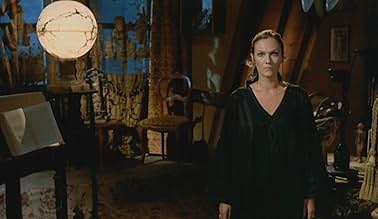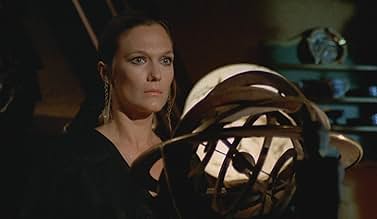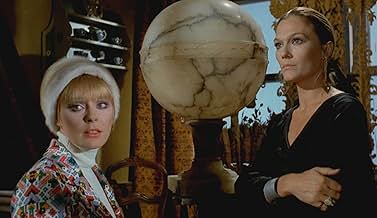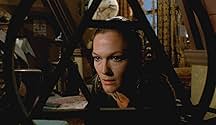NOTE IMDb
5,9/10
4,5 k
MA NOTE
Ajouter une intrigue dans votre langueA young man, visiting the castle of a murderous ancestor in Austria, accidentally brings his dead relative back to life - searching for new victims.A young man, visiting the castle of a murderous ancestor in Austria, accidentally brings his dead relative back to life - searching for new victims.A young man, visiting the castle of a murderous ancestor in Austria, accidentally brings his dead relative back to life - searching for new victims.
- Réalisation
- Scénario
- Casting principal
- Récompenses
- 1 victoire au total
Umberto Raho
- Inspector
- (as Humi Raho on US prints)
Luciano Pigozzi
- Fritz
- (as Alan Collins)
Lamberto Bava
- Man at Airport
- (non crédité)
Mario Bava
- Man Passing by the Castle
- (non crédité)
Pilar Castel
- Madeleine
- (non crédité)
Alfredo Leone
- Aircraft Passenger
- (non crédité)
Kathleen Leone
- Aircraft Passenger
- (non crédité)
Avis à la une
Imagine you knew the incantation that would bring Dracula back to life. Sure, he had a habit of murdering people from time to time, but wouldn't it be really amazing to see him in the flesh? This is essentially the premise of 'Baron Blood', although the dreaded Otto Von Kleist of the tale is far more Vlad than Dracula - a man who would happily spend the afternoon strapping someone to a rack and cutting their fingers off as we would spend it renting a DVD. Flash forward to the 20th century, where his great great great etc grandson Peter, who decides to pay a visit to his homeland of Austria during a gap year to get in touch with his roots, stumbles across just such an incantation. The chance to meet his infamous ancestor: who could resist?
Director Mario Bava shows what competent continental rivals to Hammer studios could do with the same formula. Classic horror aficionados will find much to compare, with the same ancient evils resurrected plot wise, the same helpless busty heroines, and the same near blackness films of the 70s often had, forcing the viewer to reach for the brightness control. There is even the obligatory witch to pull the story several notches away from horror in the direction of the occult, evoking "Cry Of The Banshee" to name one British contemporary. Yet despite being typical of the genre, 'Baron Blood' stands out in a few areas. Bava takes us to a real Austrian castle, the magnificent Berg Kreuzenstein, which oozes character all its own. It's also set in then-present day Austria. Hammer would often take us back a century for the action, although to be fair, this was already the era of Dr Phibes, which showed a monster in the 20th Century would probably scare the viewer more. Then, if you've got the US version, there's Les Baxter's soundtrack, which strongly suggests he didn't know it was a horror film. Why, was Stelvio Cipriani's original score deemed to scary for Americans, i.e - doing what it was supposed to do?
On the acting side of things, the cast do a fair job. Nothing award-winning, but they have just enough conviction to make you believe them. Rising above this however is the exceptional Joseph Cotton, as the mysterious Alfred Becker, a millionaire who suddenly appears out of the ether to buy the baron's castle. Given that the script is not one to hide its twists very well, Cotton is a welcome compensation. You can't help but look at him whenever he appears, wondering what he'll do next.
Overall, 'Baron Blood' breaks no new ground, but gives the genre fan most of the things they would expect, with some excellent location work and a memorable villain into the bargain. English-language viewers may scratch their heads at the mystifying score, but don't let it put you off - this is just the ticket for late-evening viewing.
Director Mario Bava shows what competent continental rivals to Hammer studios could do with the same formula. Classic horror aficionados will find much to compare, with the same ancient evils resurrected plot wise, the same helpless busty heroines, and the same near blackness films of the 70s often had, forcing the viewer to reach for the brightness control. There is even the obligatory witch to pull the story several notches away from horror in the direction of the occult, evoking "Cry Of The Banshee" to name one British contemporary. Yet despite being typical of the genre, 'Baron Blood' stands out in a few areas. Bava takes us to a real Austrian castle, the magnificent Berg Kreuzenstein, which oozes character all its own. It's also set in then-present day Austria. Hammer would often take us back a century for the action, although to be fair, this was already the era of Dr Phibes, which showed a monster in the 20th Century would probably scare the viewer more. Then, if you've got the US version, there's Les Baxter's soundtrack, which strongly suggests he didn't know it was a horror film. Why, was Stelvio Cipriani's original score deemed to scary for Americans, i.e - doing what it was supposed to do?
On the acting side of things, the cast do a fair job. Nothing award-winning, but they have just enough conviction to make you believe them. Rising above this however is the exceptional Joseph Cotton, as the mysterious Alfred Becker, a millionaire who suddenly appears out of the ether to buy the baron's castle. Given that the script is not one to hide its twists very well, Cotton is a welcome compensation. You can't help but look at him whenever he appears, wondering what he'll do next.
Overall, 'Baron Blood' breaks no new ground, but gives the genre fan most of the things they would expect, with some excellent location work and a memorable villain into the bargain. English-language viewers may scratch their heads at the mystifying score, but don't let it put you off - this is just the ticket for late-evening viewing.
A young man travels to Europe and visits the ancient castle of a rather notorious ancestor called Baron Blood, a man whose name is still not very popular in the surrounding villages. Seems the Baron was a bit of a sadist, just in case the "Baron Blood" title didn't give it away already. Our young hero, Peter, meets Elke Sommer, and instead of breaking into the castles dungeon in the middle of the night and having sex like any normal hot young couple in the early 70s,
these two brilliantly decide instead to perform a centuries old ritual designed to raise the dead. When will these people learn? The Baron rises, seen first as a Phantom-of-the-Opera type guy with a face like a spoiled casserole, and later as a wheelchair bound and Maybelline dependent Joseph Cotton.
This really isn't a bad little film. There's some great spooky lighting techniques, some even better funky music and some gorgeous shots of the European
countryside. The ancient, crumbling castle is a wonderful set and the death
scenes are quite gruesome, especially the one featuring an Iron Maiden-ish
casket and a guy who looks a LOT like the late great Peter Lorre. In a nice twist, there's even a centuries-dead witch who turns out to be the GOOD guy! (Or girl, as the case may be) The acting isn't that great, but it doesn't make this an unwatchable film by any means. The story seems loosely based on the life of
Vlad the Impaler, but still manages to be original and interesting. A nice feeling of dread permeates the entire film. One of Bava's best efforts.
these two brilliantly decide instead to perform a centuries old ritual designed to raise the dead. When will these people learn? The Baron rises, seen first as a Phantom-of-the-Opera type guy with a face like a spoiled casserole, and later as a wheelchair bound and Maybelline dependent Joseph Cotton.
This really isn't a bad little film. There's some great spooky lighting techniques, some even better funky music and some gorgeous shots of the European
countryside. The ancient, crumbling castle is a wonderful set and the death
scenes are quite gruesome, especially the one featuring an Iron Maiden-ish
casket and a guy who looks a LOT like the late great Peter Lorre. In a nice twist, there's even a centuries-dead witch who turns out to be the GOOD guy! (Or girl, as the case may be) The acting isn't that great, but it doesn't make this an unwatchable film by any means. The story seems loosely based on the life of
Vlad the Impaler, but still manages to be original and interesting. A nice feeling of dread permeates the entire film. One of Bava's best efforts.
Taking a break from his college studies, Peter Kleist (Antonio Cantafora) flies to Austria to get in touch with his heritage. He learns that his notorious ancestor was nicknamed "Baron Blood," a sadist cursed by a witch he burned to death. After meeting Eva (Elke Sommer) they playfully read an incantation at his family's castle and inadvertently bring the infamous Baron back to life, which is when people start dying. Joseph Cotton is on hand as a mysterious wheelchair-bound man who purchases the chateau at auction.
The original Italian title of Mario Bava's "Baron Blood" (1972) is "The horrors of Castle Nuremberg" (translated), which describes the film in a nutshell. In style & content it places just between Hammer gothic horror and the soon-to-come slashers.
The best thing about the flick is its spooky castle ambiance, which brings to mind hallowed horror like "The Terror" (1963), "Bloody Pit of Horror" (1965) and "The Devil's Nightmare" (1971). It's superior to the hammy "Bloody Pit," but pretty much on par with the other two, although I prefer them for various reasons. This one's marred by nonsensical script elements concerning the witch's curious curse & the Baron's unexplained abilities. Nevertheless, it's a top contender for gothic horror atmosphere.
Antonio Cantafora looks like the Euro version of Peter Fonda, albeit less formidable (physically). Meanwhile feminine charms are limited to Elke Sommer, unless you favor witchy women like Christina/Elizabeth (both played by Rada Rassimov, who resembles Celine Dion). Little redhead Nicoletta Elmi (Gretchen) would grow up to be a striking minor actress.
The film runs about 1 hour, 37 minutes, and was shot at Burg Kreuzenstein (castle) and Klosterneuburg (street scenes) & Korneuburg in Lower Austria, as well as Vienna. Writer Vincent G. Fotre was a professional tennis player who dabbled in scriptwriting.
GRADE: B-/B
The original Italian title of Mario Bava's "Baron Blood" (1972) is "The horrors of Castle Nuremberg" (translated), which describes the film in a nutshell. In style & content it places just between Hammer gothic horror and the soon-to-come slashers.
The best thing about the flick is its spooky castle ambiance, which brings to mind hallowed horror like "The Terror" (1963), "Bloody Pit of Horror" (1965) and "The Devil's Nightmare" (1971). It's superior to the hammy "Bloody Pit," but pretty much on par with the other two, although I prefer them for various reasons. This one's marred by nonsensical script elements concerning the witch's curious curse & the Baron's unexplained abilities. Nevertheless, it's a top contender for gothic horror atmosphere.
Antonio Cantafora looks like the Euro version of Peter Fonda, albeit less formidable (physically). Meanwhile feminine charms are limited to Elke Sommer, unless you favor witchy women like Christina/Elizabeth (both played by Rada Rassimov, who resembles Celine Dion). Little redhead Nicoletta Elmi (Gretchen) would grow up to be a striking minor actress.
The film runs about 1 hour, 37 minutes, and was shot at Burg Kreuzenstein (castle) and Klosterneuburg (street scenes) & Korneuburg in Lower Austria, as well as Vienna. Writer Vincent G. Fotre was a professional tennis player who dabbled in scriptwriting.
GRADE: B-/B
Peter goes to Austria to relax after getting his MA and to..."find his roots." He stays with an uncle who shows him the castle that belonged to his dead ancestor (aka Baron Blood), who was notorious for his torture chamber. He meets an architecture student named Eva and they find out the Baron was cursed under a witch's spell. So they decide to invoke the Baron's spirit. Why? Because Peter can't pass the chance to get to know one of his ancestors. Really. This is the worst Bava movie I've seen so far. Not to say it was bad. Baron Blood is very stylish and entertaining, gruesome, suspenseful, and the sets are great. The main problem is that the plot is absurd and the characters and their apparent motivations are extremely stupid. The horrid 70s song that opens and closes the movie should have never been recorded. My Rating: 5.5/10
The one thing this film has going for it is a nice atmosphere for horror fans... fog/smoke, old castles, incantation for raising the dead, scary torture chamber, weird but well filmed scenes, a witch and, above all, a mad sadist ghost or demon! The story is alright enough, not to bad.
Joseph Cotten as Baron Otto von Kleist aka Baron Blood / Alfred Becker was good - he was better in this horror film than I anticipated (I really don't think of Cotten as a horror actor that's why I mentioned it).
One thing about these types of films - the living dead or undead always seems to have plenty of money - filthy rich they are! How does a long time dead man get such riches without selling off his gold? The money has changed over the years (I think in every country) so how can he spend it - sell it I suppose to those interested in old money I guess. Whatever, I still by into it for a movie. LOL.
Not a bad film to watch for fans of the older horror - in particular the Italian horror films.
6/10
Joseph Cotten as Baron Otto von Kleist aka Baron Blood / Alfred Becker was good - he was better in this horror film than I anticipated (I really don't think of Cotten as a horror actor that's why I mentioned it).
One thing about these types of films - the living dead or undead always seems to have plenty of money - filthy rich they are! How does a long time dead man get such riches without selling off his gold? The money has changed over the years (I think in every country) so how can he spend it - sell it I suppose to those interested in old money I guess. Whatever, I still by into it for a movie. LOL.
Not a bad film to watch for fans of the older horror - in particular the Italian horror films.
6/10
Le saviez-vous
- AnecdotesSometime around 1997, there emerged a massive Internet hoax which claimed that a Siberian borehole had penetrated the Earth's crust into Hell itself, with "proof" being an audio recording of the screaming souls of the damned. This urban legend (variously known as the "Siberian Sounds of Hell" or "The Well to Hell" hoax) featured in many tabloids, and was even cited by some Christian groups as hard proof of a real Hell. The sound effects supposedly recorded within the borehole were actually a combination of story elements from a radio broadcast "Quiet Please - The Thing on the Fourble Board", and audio lifted from this film.
- GaffesWhile being chased through the streets by Baron Blood, Eva runs into the same alley twice (with the same advertisement plastered against the building).
- Versions alternativesItalian version runs 98 minutes; USA version, titled Baron Blood (1972) removes about eight minutes of footage for pacing.
- ConnexionsEdited into Baron Blood: Die Burg des Teufels - Locationtour (2017)
Meilleurs choix
Connectez-vous pour évaluer et suivre la liste de favoris afin de recevoir des recommandations personnalisées
- How long is Baron Blood?Alimenté par Alexa
Détails
- Date de sortie
- Pays d’origine
- Langues
- Aussi connu sous le nom de
- Baron Vampire
- Lieux de tournage
- Sociétés de production
- Voir plus de crédits d'entreprise sur IMDbPro
- Durée1 heure 38 minutes
- Mixage
- Rapport de forme
- 1.85 : 1
Contribuer à cette page
Suggérer une modification ou ajouter du contenu manquant

Lacune principale
By what name was Baron vampire (1972) officially released in India in English?
Répondre































